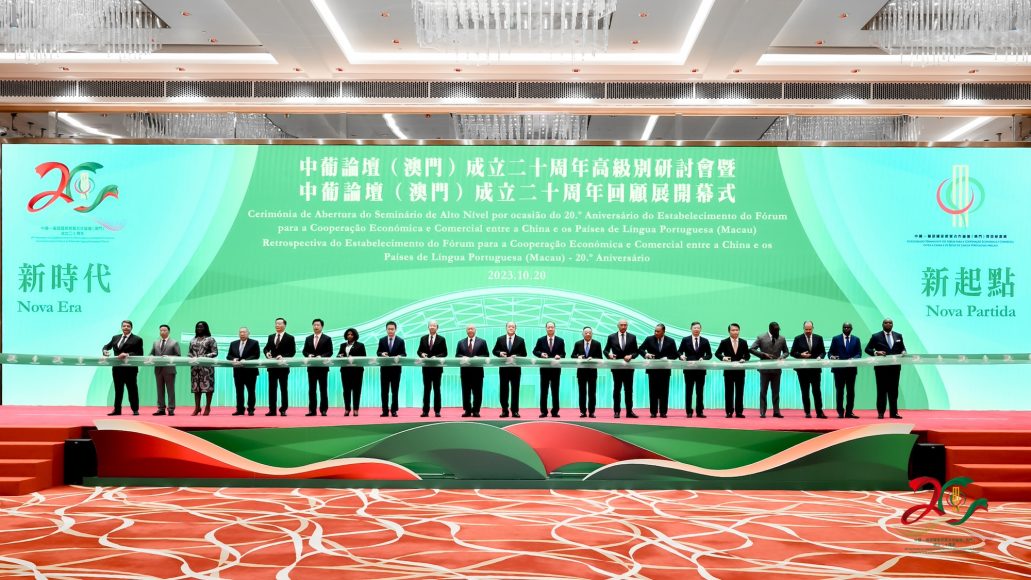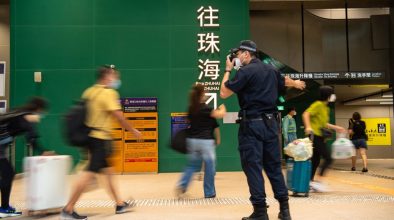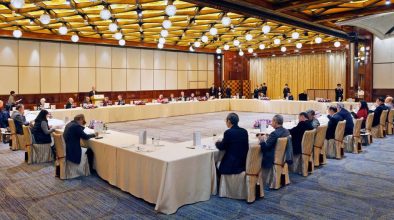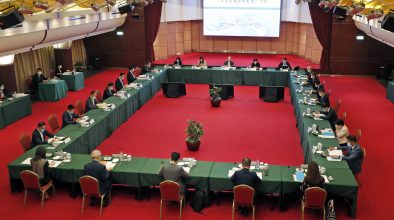Twenty years after Forum Macao’s inception, representatives from the mainland, Macao and nine Portuguese-speaking countries (PSCs) gathered to applaud its many accomplishments. Celebrations included a seminar dubbed “New Era, New Start” – held at the Pavilion of China-Portuguese-speaking Countries Commercial and Trade Service Platform which opened on 20 October and will be on show until 20 December – in which top-level officials discussed the Forum’s future. There, they expressed a desire to play more active roles in Greater China’s economic development. Especially with regards to the Guangdong-Hong Kong-Macao-Greater Bay Area (GBA), the burgeoning megalopolis established by President Xi Jinping in 2017.
The seminar unfolded against a backdrop of significant shifts in the Chinese and global economies. Navigating the Covid-19 pandemic, of course, has been the last few years’ priority. Positive developments have included the Belt and Road Initiative (BRI) and the GBA, which encompasses Hengqin’s Guangdong-Macao Intensive Cooperation Zone. Both have opened up promising avenues for investments and interactions between China and the PSCs, with Macao acting as their essential go-between.
Goods trade between China and the PSCs – Angola, Brazil, Cabo Verde, Guinea-Bissau, Equatorial Guinea, Mozambique, Portugal, São Tomé and Príncipe, and Timor-Leste – totalled US$214.8 billion in 2022, and reached US$161.5 billion in the first nine months of this year. The accumulated value of contracting projects in 2022 was US$131.7 billion, according to official Chinese sources.
Officials praise Forum Macao’s achievements
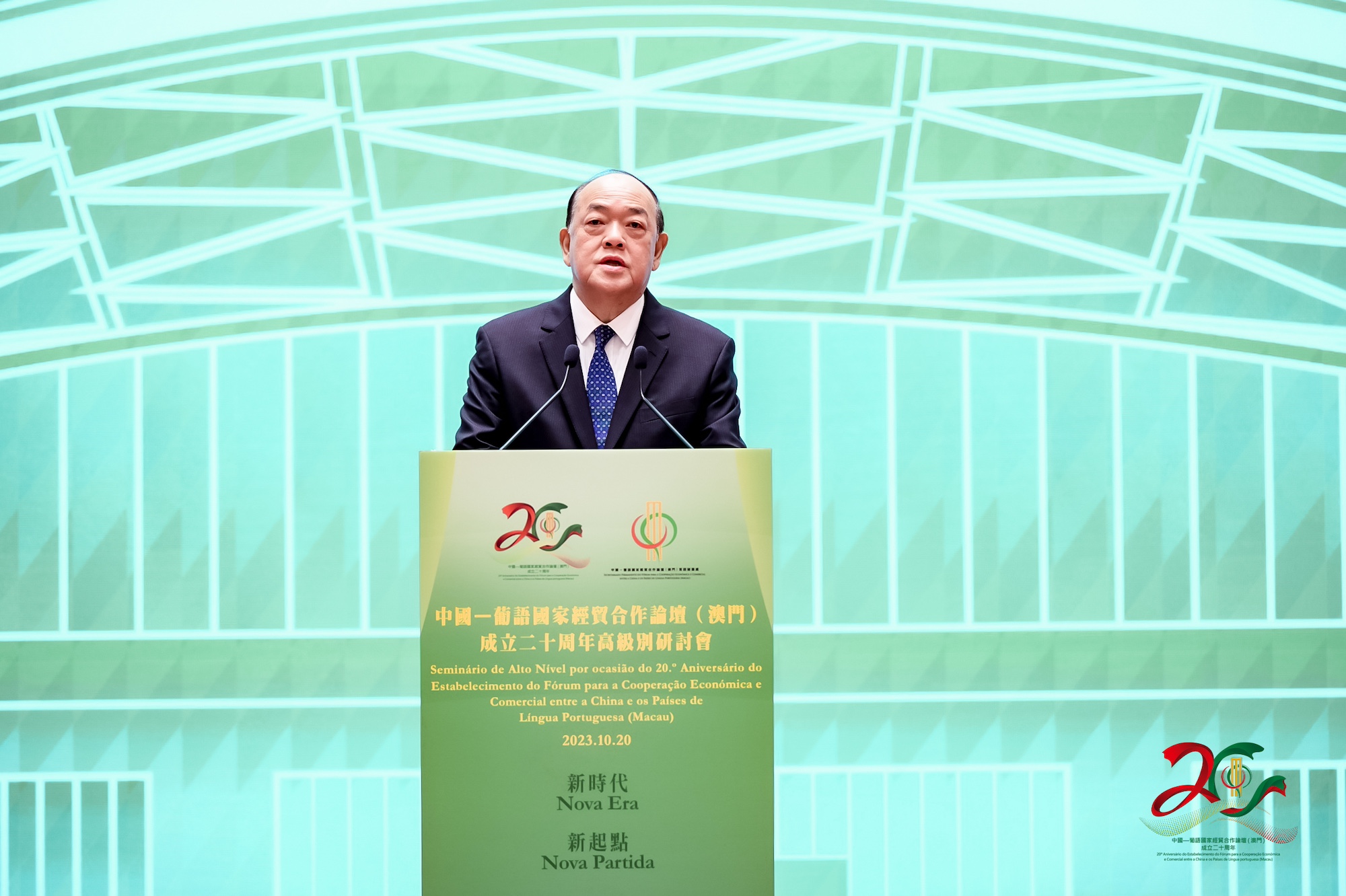
At the seminar, Macao Chief Executive Ho Iat Seng praised the Forum’s impact. “Forum Macao has served as an important platform and link for China and PSCs to carry out mutually beneficial and friendly cooperation during the past two decades, gradually becoming a propeller for advancing all-round cooperation between the two sides” he said.
Ho highlighted how, through providing local businesses with collaboration opportunities, the Forum had helped bolster Macao’s international influence and diversify its economy. He commended the Guangdong-Macao Intensive Cooperation Zone initiative, established by China in 2021, for its potential to invigorate Macao’s long-term development and strengthen its role as a Sino-Lusophone platform.
The secretary-general of the permanent secretariat of Forum Macao, Ji Xianzheng, remarked on the effectiveness of the Forum as a conduit between China and the PSCs. He acknowledged the wide range of activities the Forum facilitated. From trade and investment to industrial developments and people-to-people exchanges.
Timorese Foreign Affairs and Cooperation Minister Bendito dos Santos Freitas, meanwhile, underscored the fact that PSCs act as springboards into other markets on four continents: Europe, Africa, South America and Asia.
Cabo Verde’s minister of foreign affairs, cooperation and regional integration, Rui Alberto de Figueiredo Soares, noted that the Forum had “brought together cultures, economies and peoples that might otherwise have remained distant.” He urged all member states to continue their good work, while promoting tourism and improving market access opportunities.
The director of the Brazilian Ministry of Foreign Affairs’ China, Russia and Central Asia department, Pedro Murilo Ortega Terra, added that promoting the Portuguese language in China and trade with small and medium-sized companies “should be priorities for Forum Macao.” Terra also noted that Brazil was considering reinstating a permanent Forum Macao representative in the GBA.
Calls for change in the China-PSCs Cooperation and Development Fund
The China-Portuguese Speaking Countries Cooperation and Development Fund (PLP) was created a decade ago, by the China Development Bank and the Macau Industrial and Commercial Development Fund. It started off with US$1 billion. Half of that has since been invested in areas such as clean energy, infrastructure, agriculture and manufacturing, announced Shi Wenju – who presides over the body that manages the PLP – at the seminar. Shi emphasised the need to continue exploring sub-lending mechanisms by regional financial institutions.
The PLP’s future was hotly debated during the seminar. Portugal’s secretary of state for the economy, Pedro Cilínio, was of the view that small and medium-sized enterprises (SMEs) needed more support from the fund, while the Forum’s former deputy secretary-general, Rodrigo Brum, proposed creating a separate fund dedicated solely to development.
“The question of the fund is probably the most important question for the development of investment projects by the PSCs,” Brum said.
Forum Macao showcases culture from both China and the PSCs

In conjunction with the seminar, Forum Macao organised the 15th Cultural Week of China and Portuguese-Speaking Countries. The week celebrates the territory’s multicultural characteristics, and brought together artists from Macao, China’s Yunnan province, and each of the nine Portuguese-speaking countries. Music and dance performances, art and gastronomic exhibitions and a craft fair took place.
Ji Xianzheng described the festivities as “creating a solid basis of friendship for Sino-Lusophone cooperation.” Together, the seminar and Cultural Week showcased Forum Macao’s enduring commitment to uniting nations and cultures, forging new connections, and charting a promising course for the future.
Forum Macao’s future will be defined by four diplomatic directions
Forum Macao stands as a diplomatic success story. Looking back across the past two decades, the platform played a major role in aligning China and the Portuguese-speaking countries (PSCs) after the Macao administration’s return to China. It has provided a permanent platform for small, Portuguese-speaking island nations to develop commercially. It has also oiled bilateral relations between China and the Lusophone countries, as well as between the PSCs themselves.
As a diplomatic entity, the existence of Forum Macao relies on tri-annual inter-ministerial conferences. Thus, the future of the Forum will be shaped by the diplomatic endeavours of each member’s representative delegation. There are four main pillars here, as outlined below:
1. China
China has high expectations for the Forum and intends to advance it as a successful instrument for promoting trade, international cooperation and modernisation. China also wants Macao to diversify its economy and sees the Forum as a means of doing this, though ensuring it plays a more active role within the Guangdong-Hong Kong-Macau Greater Bay Area – which holds great potential for PSCs.
In addition, China sees the Forum as a way to promote its Belt and Road Initiative.
2. Brazil and Portugal
The two major PSCs, who already have robust bilateral relations, regard Forum Macao as complementary to their existing relationship. They value it more as a promoter for the Portuguese language in business dealings. Brazil is, of course, a member of BRICS. BRICS is the primary sphere for its close diplomatic relationship with China.
The South American giant would like to see a major rearrangement of the Forum’s Lusophone representatives, and to make it an intergovernmental platform – rather than the mechanism for multilateral cooperation it currently is.
Portugal, meanwhile, has high expectations that Forum Macao will help attract greater Chinese investment into its private sector industries. The technology, marine, and renewable energy areas in particular.
3. The Portuguese-speaking small island states
As countries getting a lot out of Forum Macao, Cabo Verde, Timor-Leste, and São Tome and Príncipe are motivated to intensify the Forum’s current forms of cooperation. They are eager to advance their respective relationships with China, with support from Forum Macao – especially with regards to leveraging their competitiveness at regional level. These relationships span education, small businesses, technology transfers, local infrastructure, renewable energy, sustainability, the blue economy, tourism and health industries.
The PSC island states see their representatives in Macao as assets that facilitate supplementary non-sovereign forms of cooperation. They are also interested in the creation of new funds to support development projects.
4. The African Portuguese-speaking countries
Angola, Mozambique, Guinea-Bissau and Equatorial Guinea are keen to engage in higher levels of cooperation with China, through Forum Macao. They are moderately motivated to expand the areas that the Forum is involved in, as a means of promoting continuous commercial dialogue with China and to advance their own economic diversification efforts. They also support the idea of a new joint investment fund.
African PSCs are looking for more balanced forms of cooperation that promote long-term sustainability and social inclusion. They are particularly interested in using the Forum to boost competitiveness at regional level, in a wide range of sectors. The African PSCs wish to increase Forum Macao’s domestic visibility and the use of Chinese yuan as international currency.
The Greater Bay Area holds great potential for Portuguese-speaking countries
While celebrating the 20th anniversary of Forum Macao, it is of the essence to look to the future. Forum Macao defines its guidelines and objectives in ministerial meetings meant to bring together the member countries every three years. After an extended period of postponement, it is now of special importance that any new directions be both carefully considered and suitable for rapid implementation.
Forum Macao already has a long history of indisputable successes. These include improved dialogue and increased internationalisation between member countries. There have been training and capacity building initiatives; the mutual dissemination of opportunities and knowledge. It’s all been made possible by the creation of an effective infrastructure for development, trade and economic relations between China and the Portuguese-speaking countries (PSCs).
This infrastructure comes in the form of a permanent secretariat based in Macao, and in the representative bodies of participant countries. For China, Macao has been a gateway to the outside world for many centuries, particularly to PSCs. Furthermore, the city is situated in what is considered one of the most open and economically vibrant regions of China – the Guangdong-Hong Kong-Macao Greater Bay Area (GBA).
While the SAR’s authorities have made great efforts to transform Macao into a city of international business tourism, other sectors and activities should also be developed to fulfil the desired economic diversification. Macao’s history and location will shape its future role as one of China’s two Special Administrative Regions (SARs).
Here, I wish to elaborate on opportunities the GBA holds for Macao and – via Forum Macao – for Portuguese-speaking countries (PSCs). It is worth noting that the GBA is home to 86 million people. That is five percent of China’s total population (and slightly larger than the entire UK). Fifty percent of people live in three cities: Guangzhou (18.8 million), Shenzhen (12.6 million) and Dongguan (10.5 million). The combined gross domestic product of Hong Kong, Shenzhen, Guangzhou alone is more than US$300 billion. More importantly, the GBA’s economy is forecast to grow faster than the rest of China in the coming years.
The international community is becoming aware of this opportunity and the potential for doing business within the GBA (and through it, with China). To name just one example, a community of South American countries has long been actively involved in Zhuhai – with yearly conferences, trade fairs and even a major presence in a convention centre in Hengqin. The PSCs’ companies and entrepreneurs should follow closely behind.
One should stress that the Chinese market is too vast for the relatively small size of companies from most PSCs. In fact, most companies from these countries are tiny – fragile when compared with their Chinese counterparts. This fact forces their strategic decisions to be directed at a fraction of the whole Chinese market. And the GBA immediately stands out as a viable segment. What’s more, it is open to international companies and aware of the importance of PSCs; they are viewed as a group of countries that have support and recognition from the central government in Beijing.
Because of that support, major initiatives and endeavours from PSCs will be warmly welcomed and – I am sure – realised. Such is the quality of planning and commitment always demonstrated by the Chinese authorities and entities involved.
